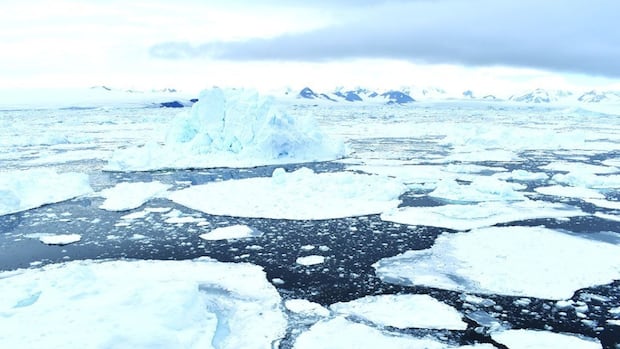For years, scientists have been toying with the idea of artificially modifying the climate through geoengineering — especially in the Arctic, which is warming four times as fast as the rest of the world.
The main proposals include artificially thickening sea ice, fertilizing the ocean with iron and releasing sunlight-reflecting particles into the atmosphere to reduce the sun’s warming effect.
Though the feasibility of these ideas was always questionable, researchers are now saying in a new study they are certain they’re a waste of time and money.
Much of the group met through a joint effort after COP28 in Dubai, when they came together to denounce polar geoengineering. For the paper, they looked into the five of the most developed geoengineering proposals currently being considered for use in the polar regions and found that they all failed basic feasibility criteria and could do “severe environmental damage.”
Their findings were published in the journal Frontiers in Science on Monday.
“There’s a lot of false hope being created, suggesting that a little intervention will solve the problem,” said co-author Martin Sommerkorn from the World Wildfire Fund.
“There are really no shortcuts to fixing climate change.… Our research really shows that there is long-term commitment required over many, many years.”
We don’t know enough
“At face value, a lot of these techniques logically make sense … but once you start to think about it in a practical sense, it just doesn’t,” said Helen Amanda Fricker, a Scripps Institution of Oceanography professor at UC San Diego and one of the lead authors of the study.
The issue, she said, is that most people don’t realize the scale of some of the ice sheets — “beyond human comprehension.”

She focused on going through all the published literature on taking basal water out from underneath glaciers to stop them from moving as quickly. She said the strategy had too many logistical issues.
The recent paper was a group effort, but researchers worked on specific sections, looking at the most commonly proposed geoengineering methods and evaluating their feasibility, effectiveness, cost, how they would be governed and possible negative consequences.
“We did it very thoroughly and it took a long time and was systematic,” Fricker said.

Paper co-author Julienne Stroeve from the University of Manitoba also said that even if solutions were to work locally — although she still wouldn’t find them realistic — there would still be second-order consequences in other parts of the world.
“Even if you try to cool the Arctic by helping the sea ice last longer, then you’re still warming the mid-latitudes or the equator,” Stroeve told CBC News.
“Then you’re just going to invigorate all your storm systems to bring that excess heat up to the polar regions, because that’s what our weather patterns do.”
Projects like solar geoengineering in the Arctic might technically be feasible, she said, but could have unintended consequences, such as disrupting rainfall systems in the Global South.
The paper also mentions about how investing more resources into geoengineering research will distract from what the researchers say is really needed: a reduction in carbon emissions — fast.
A distraction from decarbonization?
However, others disagree.
Steve Desch is an astrophysics professor at Arizona State University. He believes tackling climate change will require multiple approaches, but isn’t surprised by the paper’s conclusions.
“This is not the first time we’ve encountered this sort of attitude, and I think it’s a very knee-jerk reaction and a naive take on the reality of our time,” he said.
“I think that the role of scientists is to explore the physical ramifications and the technological feasibility of different things and present stakeholders with the costs and benefits of different options and then let everyone decide.”
Desch clarified that he doesn’t think anyone involved in geoengineering would say it should replace decarbonization.
“We all agree decarbonization is key,” he said. “But in the meantime, should we not explore these other options to keep things from getting worse, as well?”
Desch has seen progress in his own research, where he’s been testing artificially thickening sea ice by pumping water onto it. Though he says further research is needed, he sees potential in doing this to a portion of the Arctic.
“We feel confident that whatever effects it would have pale in comparison to the complete loss of sea ice, which we’re headed for.”
Governance challenges
Greg Henry has worked in the Arctic for over 40 years. He’s seen firsthand how rapidly the Arctic is changing.
“The speed of what’s happening is the scary part, and I can understand why we’re at the stage where these scientists and engineers are proposing these planetary-scale projects to essentially buy us time,” he said.
Henry, a geography professor emeritus at the University of British Columbia, says he understands why people are looking for solutions, but still finds geoengineering too risky.
He believes that the resources should be focused on decarbonization, instead.
“We really don’t have a full understanding of what would happen if we threw a whole bunch of particles into the stratosphere,” said Henry.
While certain big volcanic eruptions have been shown to cool the planet, he says it’s difficult to replicate anything at that scale, and it’s not clear how projects like this will affect Indigenous communities in the Arctic.
“These projects are so enormous and so expensive and so fraught with unintended consequences, it seems almost silly to take them on.”
Henry points to China as an example of a country progressing toward decarbonization and solar energy. He says it’s for political reasons — to reduce its dependence on foreign oil — and easier to implement because of its current political system, but it shows that it’s possible to change.
“You could argue that our own more progressive government in Canada is not really leaping to the challenge here,” he said. “I personally think [decarbonization] should be one of the Liberal government’s big projects.”







